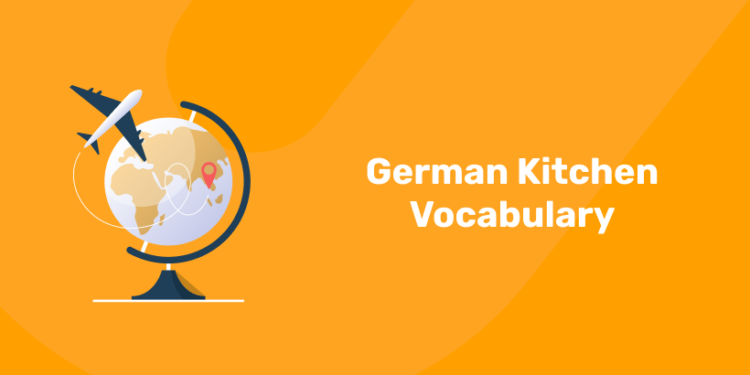Table of Contents
Introduction
In every home the kitchen is the heart, where culinary creativity happens and delicious memories are made. For those learning German, knowing kitchen vocabulary is not only important for following recipes but also for talking about food, cooking and culture. German kitchen vocabulary is vast and covers everything from cooking utensils to ingredients so you can dive into the language while exploring German cuisine. In this post we will go through essential German kitchen vocabulary, give you tips for memorization and share resources to help you improve your language skills.
German Kitchen Vocabulary Lists
1: How do you say "Good Morning" in German?
To get you started we have put together a list of essential German kitchen vocabulary in different sections. Whether you are a beginner or an experienced chef, knowing these will make your German language culinary adventures more fun.
Cooking Utensils
- Messer – Knife
- Gabel – Fork
- Löffel – Spoon
- Pfanne – Frying pan
- Topf – Pot
- Schüssel – Bowl
- Reibe – Grater
- Schneidebrett – Cutting board
- Küchenmaschine – Food processor
- Backblech – Baking tray
Cooking Methods
- Kochen – To cook
- Braten – To fry
- Backen – To bake
- Dämpfen – To steam
- Grillen – To grill
- Schneiden – To cut
- Mischen – To mix
- Rühren – To stir
- Würzen – To season
- Schälen – To peel
Ingredients
- Zutat – Ingredient
- Gemüse – Vegetables
- Obst – Fruits
- Fleisch – Meat
- Fisch – Fish
- Milch – Milk
- Eier – Eggs
- Mehl – Flour
- Zucker – Sugar
- Salz – Salt
Dishes
- Suppe – Soup
- Salat – Salad
- Kuchen – Cake
- Pasta – Pasta
- Brötchen – Bread roll
- Wurst – Sausage
- Schokolade – Chocolate
- Käse – Cheese
- Eintopf – Stew
- Pizza – Pizza
Kitchen Gadgets
- Herd – Stove
- Backofen – Oven
- Mikrowelle – Microwave
- Kühlschrank – Refrigerator
- Gefrierschrank – Freezer
- Spülmaschine – Dishwasher
- Toaster – Toaster
- Wasserkocher – Kettle
- Mixer – Blender
- Dampfdrucktopf – Pressure cooker
Phrases to use in the kitchen
- Wo ist das Messer? – Where is the knife?
- Ich brauche mehr Wasser. – I need more water.
- Schneide das bitte. – Cut that.
- Wie lange? – How long?
- Es ist fertig. – Done.
Free German A1 Mock Tests – Powered by AI!
Test your skills on our interactive platform. Get instant feedback from our AI to help you communicate better and track your progress. Start your free German mock test now.
Test Your German A1 for FreeGerman Kitchen Vocabulary Tips
Learning vocabulary can be overwhelming but with the right strategies it can be fun and effective. Here are some tips for memorizing and using German kitchen vocabulary:
1. Flashcards
Make flashcards with the German word on one side and the English translation on the other. Review these regularly to commit to memory. You can also add pictures to help you visualise.
2. Label your kitchen
If you have a kitchen, label your utensils and appliances with the German words. You’ll see them all the time and remember the words in context.
3. Cook in German
Follow German recipes or cooking videos. Practical application of vocabulary in real life helps with retention and gets you used to seeing vocabulary in action.
4. Chat
Find a language partner or join a language exchange group. Talking about recipes, cooking techniques and favourite dishes in German will reinforce your vocabulary and speaking skills.
5. Use Language Learning Apps
Consider using language learning apps like Entri which has comprehensive German language courses. These apps often have interactive vocabulary exercises, quizzes and engaging content tailored to your level.
More Resources to Learn German Vocabulary
For extra help, check out:
Online Courses
Entri has a German language course that covers everything from the language, including kitchen vocabulary. With expert teachers and interactive lessons you’ll build your confidence. Start your German journey with Entri today!
Language Learning Blogs
Follow language learning blogs about German. They often have tips, vocabulary lists and cultural insights to help you understand the language.
YouTube
There are many YouTube channels that teach German. Look for channels that focus on vocabulary and cooking to see the words in action while cooking yummy recipes.
Mobile Apps
Download vocabulary building apps. Many of these apps have spaced repetition and gamification to make it more fun.
Conclusion
Learning German kitchen vocabulary is key to becoming a better German cook. Whether you want to cook real German recipes, chat with others or just understand food related conversations, a solid vocabulary base will help you.
By following the tips in this post (flashcards, practice with real recipes, conversations) you’ll see that learning German kitchen vocabulary can be fun and easy. And with Entri’s full German course you have the structure and support to succeed.
Free German A1 Mock Tests – Powered by AI!
Test your skills on our interactive platform. Get instant feedback from our AI to help you communicate better and track your progress. Start your free German mock test now.
Test Your German A1 for FreeFrequently Asked Questions
What is German kitchen vocabulary, and why is it important?
German kitchen vocabulary encompasses words and phrases related to cooking, utensils, ingredients, and culinary techniques in the German language. It is essential for anyone learning German, especially those interested in cooking or living in a German-speaking country. Understanding this vocabulary enables learners to follow recipes, engage in cooking conversations, and appreciate German culinary culture.
How can I effectively memorize German kitchen vocabulary?
To effectively memorize German kitchen vocabulary, try using flashcards with pictures, practicing cooking with German recipes, and labeling your kitchen items in German. Engaging with the vocabulary in context, such as through conversations or cooking videos, can also reinforce your memory and make learning more enjoyable.
Are there specific phrases I should know for cooking in German?
Yes, there are several useful phrases, such as “Wo ist das Messer?” (Where is the knife?), “Ich brauche mehr Wasser.” (I need more water.), and “Das Essen ist fertig!” (The food is ready!). Familiarizing yourself with these phrases will help you communicate effectively in the kitchen.
What resources can I use to learn German kitchen vocabulary?
Various resources are available, including language learning apps like Entri, online courses, YouTube cooking channels, and language blogs. These platforms often provide interactive exercises, vocabulary lists, and cultural insights, making it easier to learn and apply kitchen vocabulary.
How does learning kitchen vocabulary enhance my overall German language skills?
Learning kitchen vocabulary enhances overall language skills by providing context for vocabulary usage, improving listening comprehension through cooking shows, and encouraging speaking practice during cooking sessions. It also allows learners to engage more deeply with German culture and cuisine, enriching their language experience.
Can I find German kitchen vocabulary in cookbooks?
Absolutely! Many German cookbooks contain a glossary of terms that can help you learn kitchen vocabulary in context. By reading and following these recipes, you can see how the vocabulary is used practically, which aids in retention.
What are some common mistakes learners make with German kitchen vocabulary?
Common mistakes include mispronouncing terms, confusing similar-sounding words, and using vocabulary in the wrong context. To avoid these errors, practice pronunciation regularly, engage with native speakers, and seek clarification when unsure about the appropriate usage of a term.
How often should I practice using German kitchen vocabulary?
Consistency is key! Aim to practice at least a few times a week. Incorporate vocabulary into your cooking routine, participate in conversation exchanges, or dedicate time each week to study and review the terms. Regular practice will help reinforce your learning and boost your confidence.
Are there specific dialects or regional variations in German kitchen vocabulary?
Yes, just as with any language, German has regional dialects that may introduce variations in vocabulary. For instance, certain ingredients or dishes may have different names in Bavaria compared to Berlin. Familiarizing yourself with these variations can enhance your understanding and appreciation of German cuisine.
How can I engage with others while practicing my German kitchen vocabulary?
Engage with others by joining a language exchange group focused on cooking, participating in cooking classes, or hosting a German-themed dinner party where you can use your vocabulary in conversation. Online communities and forums dedicated to language learning can also provide opportunities to practice and connect with fellow learners.











